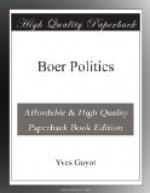4.—The Annexation of the Transvaal and the Conventions of 1881 and 1884.
M. Kuyper is very unjust when he reproaches the English with the massacre of the Zulus; for it was all to the profit of the Boers, who, it may be added, rendered no assistance. Once delivered from their native enemies by the English, the Boers appointed, December 16th, 1880, a triumvirate, composed of Pretorius, Krueger and Joubert. They demanded the re-instatement of the South African Republic, under British protection; they commenced attacking small detachments of English troops, and on February 27th they surrounded a force on Majuba Hill, killing 92 officers and men, General Colley among them, wounding 134, and taking 59 prisoners. That is what is called “the disaster of Majuba Hill.” An army of 12,000 men was on the way out; Mr. Gladstone, in his Midlothian Campaign, had protested against the annexation; and, although, after he became Prime Minister, he supported it in the speech from the Throne, the hopes he had given to the separatists proved well founded, for after this defeat he became a party to the Convention of 1881, by which the independence of the Transvaal, under the suzerainty of England, was recognized.
5.—The Convention of 1881 inapplicable.
It must be confessed, that the Liberal Government committed a grave error. It seemed afraid of a rebellion among the Afrikanders of the Cape; and these quickly learned that threats only were needed to induce the English Government to yield to their demands. The English Garrison in Pretoria was withdrawn; no reparation was exacted from the Boers who, under the command of Cronje, had conducted themselves in an infamous manner at the siege of Potchefstroom, and had been guilty of actual treachery in the case of Captains Elliot and Lambert.




